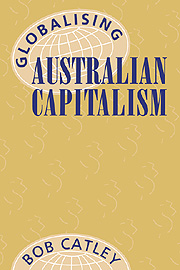Book contents
- Frontmatter
- Contents
- List of Tables
- List of Figures
- Preface and Acknowledgements
- List of Abbreviations
- Introduction
- 1 The International System and the End of the Cold War
- 2 The World Market and the Industrial Revolution in Asia
- 3 The Australian State and Economic Development
- 4 Economic Rationalism Changes Australian Politics
- 5 Government and Business in Australia
- 6 The Public Sector Reinvented
- 7 Australian Industry Restructures
- 8 Geographic Dimensions of Change
- 9 Australia Joins the Asia-Pacific Region: from ANZUS to APEC
- 10 All in a Day's Work
- Notes
- Index
4 - Economic Rationalism Changes Australian Politics
Published online by Cambridge University Press: 14 January 2010
- Frontmatter
- Contents
- List of Tables
- List of Figures
- Preface and Acknowledgements
- List of Abbreviations
- Introduction
- 1 The International System and the End of the Cold War
- 2 The World Market and the Industrial Revolution in Asia
- 3 The Australian State and Economic Development
- 4 Economic Rationalism Changes Australian Politics
- 5 Government and Business in Australia
- 6 The Public Sector Reinvented
- 7 Australian Industry Restructures
- 8 Geographic Dimensions of Change
- 9 Australia Joins the Asia-Pacific Region: from ANZUS to APEC
- 10 All in a Day's Work
- Notes
- Index
Summary
In 1983 the new Labor government took its first steps towards internationalising the Australian economy by deregulating the financial sector and floating the Australian dollar. This globalisation of the economy imposed a profound refocusing of political debate in Australia. During the following decade the issue at the centre of Australia's politics ceased to be: how can government intervene in economic life to create desirable social outcomes? By the 1990s it had been reformulated as: how can government create competitive market situations to ensure world-best practice is pursued and international standards are achieved? Not all parties embraced this view with equal enthusiasm or with equal speed, but the trend was evident across the political spectrum. It has also attracted considerable attention from commentators, who spent much of the 1980s complaining that Labor had abandoned its traditional policy under Hawke. Old-style politicians from each of the parties, like former prime minister Malcolm Fraser or former Whitlam minister Jim McClelland, criticised their successors for having lost touch with the party's basic principles.
In fact each political party grappled to create an appropriate response within its own broad philosophy to the changes consequential on Australia's unavoidable decision to open itself further to the world market. As it became progressively clearer that these changes would be extremely wide ranging, and as the phased removal of barrier protection imposed greater urgency on the tasks and took that pressure into wider areas of political, economic and social policy, the debates within each party became more urgent. During this process it remained possible to discern a Left–Right axis of the kind classical to developed capitalist democracies.
- Type
- Chapter
- Information
- Globalising Australian Capitalism , pp. 65 - 86Publisher: Cambridge University PressPrint publication year: 1996



